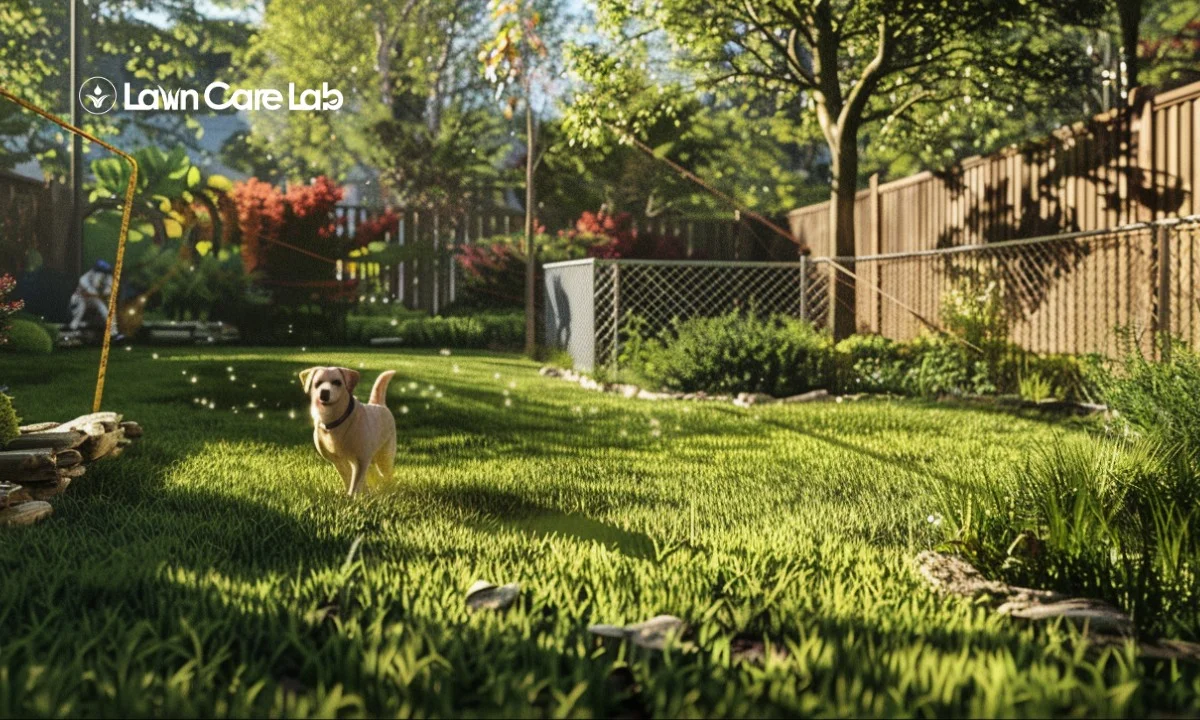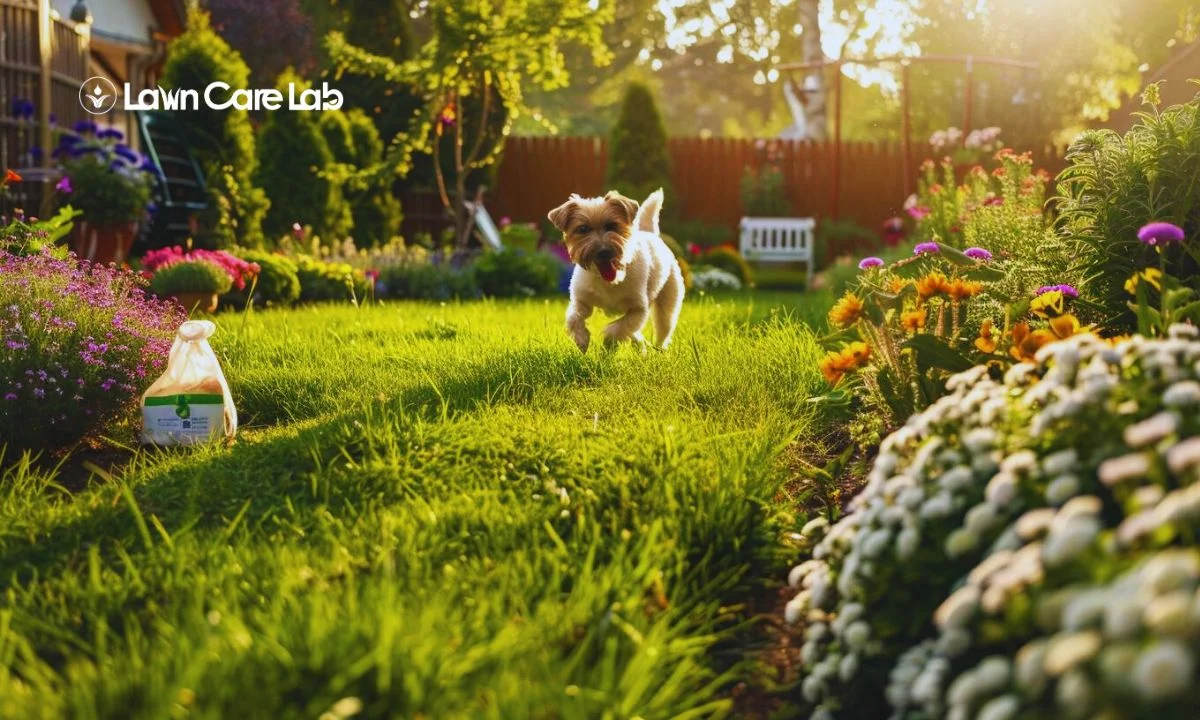As a pet owner with a yard, you might be surprised to learn the potential hazards traditional lawn care products can pose to your beloved animals. It’s high time we consider adopting organic, pet-friendly lawn care solutions.
This article will provide insightful information about the advantages of such solutions, their vital elements, and pragmatic ways to incorporate them into your lawn care routine. We’ll also dispel some common misconceptions about organic lawn care.
Here’s to creating a safer, greener oasis for your four-legged companions.
Table of Contents
The Rise of Organic Pet-Friendly Lawn Care
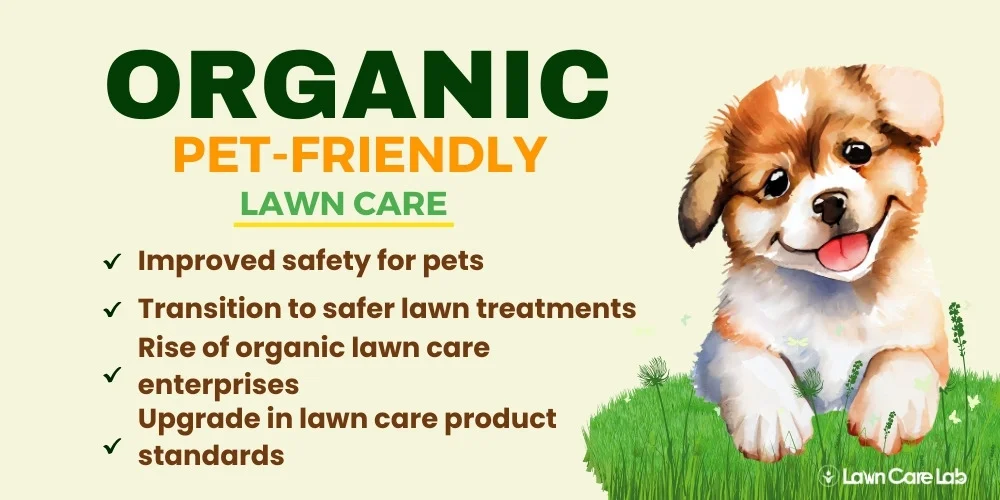
Pet owners are opting for organic Pet-Friendly lawn care solutions due to concerns over the negative impact of chemicals on pets’ health and a desire for eco-friendly living.
Choosing organic methods is a way to ensure the well-being of pets and contribute to environmental stewardship.
Recognizing the Need for Safer Lawn Solutions
The growing awareness about environmental toxins, especially in lawn care products, is pushing pet owners to seek alternatives that promise safety and health for their animals. Reflecting on this, we’re witnessing:
| Consumer Trend | Impact |
|---|---|
| Increase in organic products specific to pet care | Improved safety for pets |
| Rising consciousness of toxin existence | Transition to safer lawn treatments |
| Desire for healthier lawn care methods | Rise of organic lawn care enterprises |
| Educated consumers | Upgrade in lawn care product standards |
These observations underscore the rising demand for pet-safe, organic lawn care options.
Advocating Eco-Conscious Pet Ownership
Embracing organic lawn care aligns with the broader responsibility of protecting the environment while caring for our pets. More pet owners are realizing the direct correlation between their choices and their pet’s health, which is driving them towards organic and safe lawn care methods that foster lush lawns without exposing pets to harmful chemicals.
The Perils of Traditional Lawn Care on Pet Health
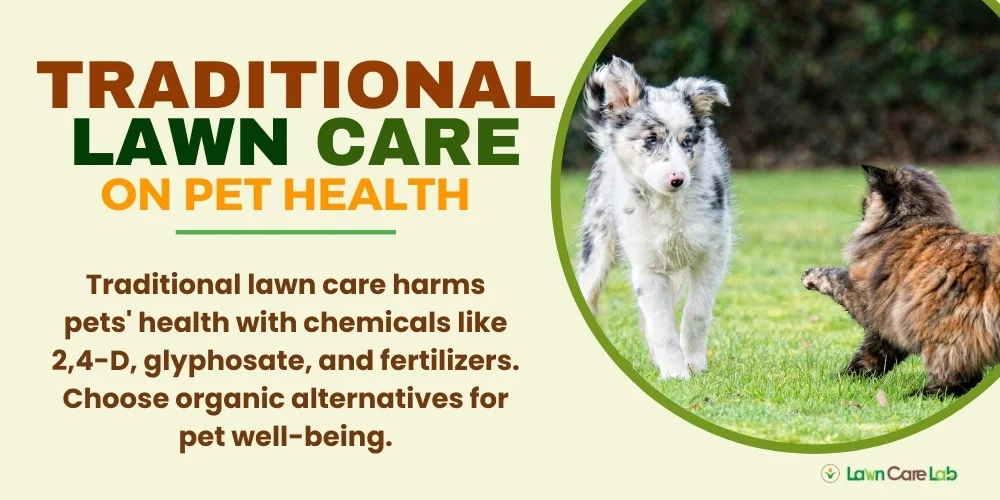
While easy to overlook, routine lawn maintenance products can adversely affect your pet’s well-being.
Common lawn care chemicals have been linked to severe health concerns, including respiratory issues, skin conditions, and even cancer. This knowledge is critical, urging a pivot towards more planet-friendly and organic alternatives.
Common Chemical Culprits and Their Effects
In navigating organic lawn care, understanding the risks posed by certain lawn chemicals is crucial:
- 2,4-D (Dichlorophenoxyacetic acid): This prevalent herbicide shows connections with canine lymphoma.
- Glyphosate: Commonly found in weed exterminators, it is tied to various pet health problems.
- Organophosphates and carbamates: These insecticides have a reputation for causing neurotoxic effects.
- Pyrethroids: Present in numerous pesticides, they can prompt tremors, seizures, and in severe cases, fatality in pets.
- Fertilizers: High nitrogen content can trigger gastrointestinal discomfort and even burns on pets’ paws.
Prioritizing pets’ health means choosing organic and pet-friendly alternatives.
The Long-Term Consequences for Pets
Traditional lawn care can harm pets in the long run, causing serious health issues. Organic weed control and fertilizers can help reduce these risks.
The following chart provides a comprehensive overview of potential hazards:
| Harmful Substance | Possible Long-term Consequences | Suggested Preventative Measures |
|---|---|---|
| Glyphosate | Hormonal disruption, cancer | Switch to organic weed control methods |
| 2,4-D | Organ damage, cancer | Choose organic fertilizers |
| Carbaryl | Neurological disorders | Implement natural pest control strategies |
| Permethrin | Liver damage, cancer | Steer clear of artificial pesticides |
| Chlorpyrifos | Neurological disorders, cancer | Opt for organic insecticides |
It is wise to be forward-thinking and adopt organic, pet-safe lawn care alternatives.
Key Ingredients of Organic Pet-Friendly Lawn Solutions
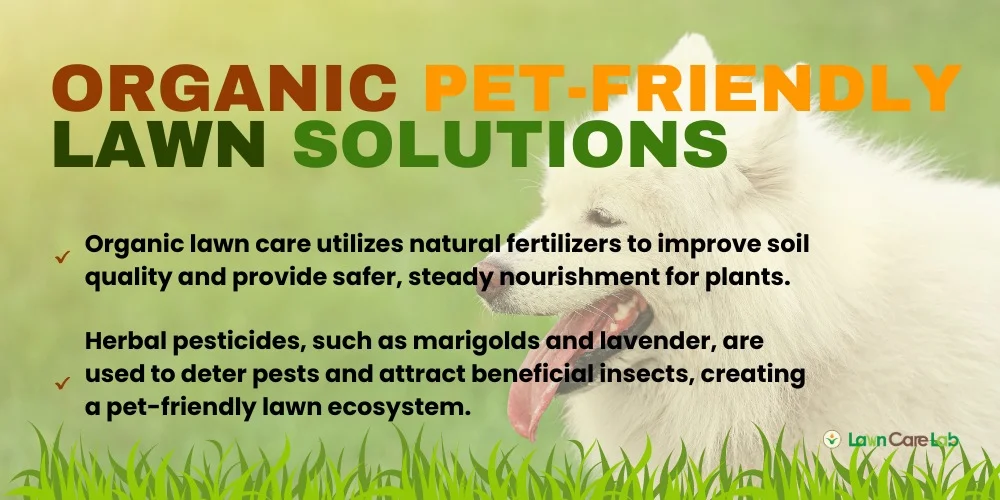
Organic lawn care avoids chemicals that could harm pets, using natural fertilizers and herbal pesticides instead. Companion planting fosters a diverse ecosystem that’s beneficial to lawn health.
Natural Fertilizers and Their Benefits
Turning to natural fertilizers often yields a safer, flourishing garden.
Let’s examine the reasons why:
- Soil Quality: They enrich the soil for stronger, healthier growth.
- Eco-Friendly: Sourced from renewable materials, they reduce environmental impact.
- Safer for Pets: Devoid of harsh chemicals, they pose no threat to animal health.
- Better Nutrient Release: They provide slow, steady nourishment to plants.
- Disease and Pest Resilience: They enhance natural defenses against pests and diseases.
Natural fertilizers are foundational for a pet-friendly, vibrant lawn ecosystem.
Herbal Pesticides as Safe Alternates
Companion planting is essential for an organic, pet-friendly lawn. It deters pests and attracts beneficial insects, resulting in a robust and pet-approved lawn.
To better understand, let’s look at a few examples of plants that make perfect companions:
- Marigolds: These eye-catching blossoms are reputed for their ability to ward off nematodes and various pests.
- Chamomile: A plant that serves as a magnet for beneficial insects, such as ladybugs.
- Garlic: With its potent aroma, garlic keeps unwelcome pests at bay.
- Lavender: More than just a calming aroma, lavender is known to deter fleas and moths.
- Basil: This culinary herb doubles up as a repellent for flies and mosquitoes.
Choosing these plants for your lawn ensures an environment that’s both safer for your pets and healthier for your greenery.
Implementing Organic Lawn Care at Home
Adopting organic lawn care practices may seem daunting, but can be simplified into actionable steps:
- Gradually reduce chemical use to avoid shock to your lawn’s ecosystem.
- Introduce organic fertilizers and compost to nurture soil health.
- Replace chemical herbicides with organic weed control methods such as manually pulling weeds or using vinegar-based sprays.
- Consider transitioning your lawn to include native, low-maintenance plants.
- Maintain your grass at 3 inches in height for deeper root growth and to naturally prevent weed growth.
- Water your lawn thoroughly but not too frequently to encourage deeper root growth. Water in the morning to reduce evaporation and fungal diseases.
During this transition, your lawn may undergo visible changes as it adapts to a healthier, organic routine—a positive sign for both the environment and your pets.
Seasonal Considerations for Organic Lawn Care
An organic lawn care regimen must be adapted throughout the seasons:
- Spring: Prepare the soil with organic compost and preventive weed control.
- Summer: Maintain a lush lawn with consistent watering and mowing routines.
- Autumn: Utilize aeration and overseeding to encourage robust growth.
- Winter: Minimize damage by avoiding walking on frost-covered grass.
Maintaining vigilance against pests and diseases year-round is crucial, always using pet-safe, organic methods.
Addressing Organic Lawn Care Myths
Organic lawn care can be as effective as traditional methods and need not be expensive or time-consuming. With the right plan, we can confidently embrace a safer approach to lawn maintenance.
Let’s address some prevalent misconceptions:
- Organic lawn care is less effective: Research indicates that organic fertilizers contribute to soil health progressively, resulting in more robust, flourishing lawns.
- Organic methods are expensive: Even though the initial expenditure might be higher, the overall maintenance costs tend to be lower in the long run.
- Organic products aren’t widely available: Many lawn care suppliers now carry an extensive selection of organic items.
- Organic lawn care is time-consuming: Organic lawns often demand less upkeep after the initial setup.
- Switching to organic is difficult: The shift towards organic can be smooth with appropriate planning and guidance from seasoned professionals.
Committing to organic lawn care is a prudent decision, considering your pet’s well-being and environmental sustainability.
Conclusion
Opting for organic, pet-friendly lawn care is beyond a mere fad—it’s an essential move to protect our pets and the planet. By understanding and adopting organic lawn care strategies, we commit to a future where our pets can play and thrive in a safe, naturally beautiful outdoor space.
- How Green Spaces Influence Community Interactions - July 8, 2024
- Lawn Fungal Diseases: Identification and Treatment - July 3, 2024
- Lawn Care for All Seasons: A Year-Round Guide for Extreme Climates - June 24, 2024

